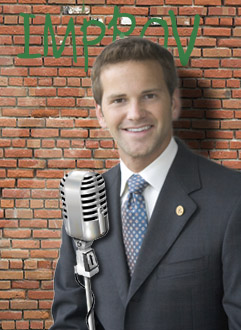Last night the three Republican candidates for the 18th Congressional District participated in another debate — this one sponsored by the Peoria Young Republicans and televised live on WMBD-TV. Video clips of the debate are supposed to be posted on centralillinoisproud.com sometime today.
The candidates gave opening statements, then answered one question on a litany of topics ranging from agriculture to education. After each round of questions, the candidates had an opportunity for rebuttal. There was no opportunity for the candidates to ask each other questions.
I thought Schock and McConoughey tied as winners of this debate. I’ve been very disappointed with Morris. His answers lack substance on many issues, and he makes up for it with rhetoric and doublespeak. He seems preoccupied with trying to get in little jabs at Schock.
One need look no further than the first question for a perfect example. It was about the farm bill. Schock said he would like to see a stronger safety net for farmers and increased promotion of ethanol. McConoughey wants to fully fund risk insurance, and talked about what he’s already done to help farmers by creating a Port district to help reduce input and output costs. Morris? Oh, he’s “excited about representing farmers,” he’s going to “work hard to protect the interests of farmers and America’s food supply,” and he’s going to “continue to work with farmers.” And he’s “known farmers his entire life.” His whole answer went on and on like this. That’s called doublespeak, and it tells me that he doesn’t know anything about the farm bill, whereas Schock and McConoughey do.
On the next question, on foreign policy, Morris said he has a “full-blown proposal on national security.” Unfortunately, he didn’t share any of it at this debate. He said we need a “serious approach to foreign policy.” We need to “support our troops” and “get the job done.” He said that we shouldn’t de-fund the troops. He mentioned a second time that he has a “full-blown proposal.” And he used his rebuttal time to blast Schock for his nukes-to-Taiwan faux pas again. Schock and McConoughey, in contrast, offered specific policy initiatives that went beyond just Iraq, but also included securing our borders.
The whole debate was like this. I really don’t understand those who are coming away from these debates as big Morris supporters. I like Morris personally, and I was actually hoping to like his positions and support him in this race, but after hearing his answers in these debates, I’ve been driven to support McConoughey instead. I thought McConoughey spoke much better this time — this might be because this is the first time I’ve seen him while he was speaking (which makes a difference). The last debate was on the radio.
Schock is clearly a bright guy, and if it weren’t for a couple of things I might have been able to support him. But I really can’t trust a guy who lied to the Illinois House about Senate Bill 2477, saying the entire city council supported it, and helped push through a bill that was in essence a property tax increase on Peoria residents. Remember that when he says he’s for lower taxes — he strongly supported a bill that gave District 150 the ability to raise your property taxes without a referendum through the Public Building Commission. And of course, the nukes-to-Taiwan thing showed some frightening lack of judgment.
McConoughey isn’t the perfect candidate. He was a little weak on the education question, not seeming to understand “No Child Left Behind” very well. He either forgot to answer or evaded the same-sex marriage question. But of the three Republican candidates, I would trust him the most to represent me in Congress. He has the best understanding of economic and agricultural issues of the three, he’s strong on national defense, and he’s conservative on social issues.
I say, vote for Jim.

 Remember
Remember  I was e-mailed some documents that give a little more detail about the Manual High School restructuring plans, and I thought some of my readers might be interested in reading them:
I was e-mailed some documents that give a little more detail about the Manual High School restructuring plans, and I thought some of my readers might be interested in reading them: